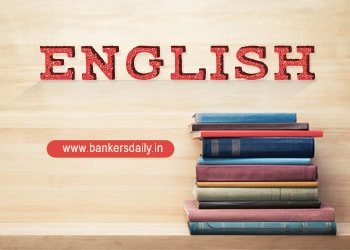Golden rules for Spotting Errors – Part 1 prepared by SBI PO Focus Team
Want to Become a Bank, Central / State Govt Officer in 2020?
Join the Most awarded Coaching Institute & Get your Dream Job


Now Prepare for Bank, SSC Exams from Home. Join Online Coure @ lowest fee
Lifetime validity Bank Exam Coaching | Bank PO / Clerk Coaching | Bank SO Exam Coaching | All-in-One SSC Exam Coaching | RRB Railway Exam Coaching | TNPSC Exam Coaching | KPSC Exam Coaching
Golden rules for Spotting Errors – Part 1 prepared by SBI PO Focus Team
Based on Subject Verb
Rule 1 Make a verb agree in number with its subject; make a pronoun agree in number with its antecedent.
The list of spare parts was long. (Singular)
The lists of spare parts were long. (Plural)
Singular subjects take singular take singular verbs (list→was), and plural subject take plural verbs (lists→were).
Even an animal has its own territory. (Singular)
Even animals have their own territory. (Plural)
Singular antecedents are referred to by singular pronouns (animal→its) and plural antecedents are referents if plural pronouns (animal→their)
Exception: A plural verb is always required after you even when it is used in singular, referring to one person, e.g:
You were very helpful during my stay with you.
Note: ‘s’ added to a noun indicates the plural from but ‘s’ added to a verb indicates the third person singular.
She favours the move.
They favour the expansion of the school.
Rule 2 Ensure the verb agrees with the true subject and not with an intervening plural object of a preposition or any other intervening plural.
The box of Nestle’s chocolates is missing.
(Here the true subject is box and not Nestle’s chocolates. Chocolates is the object of preposition of.)
His experience as teacher to boys and girls gives him understanding.
The prices of the new model vary from town to town.
Rule 3 Subjects joined by and are usually plural and take plural verbs.
His typewriter and my radio were stolen.
Sony and Snajay are going to Chennai today.
Exception
(a) If a subject consisting of two singular nouns connected by and refers to the same person or thing, a singular verb is used.
My best friend and advisor has changed his mind again.
Here the subject is treated as singular because both qualities are found in one person.
Cornflakes and milk is our Sunday breakfast.
(b) When two subjects connected by and preceded by each, every or many a, a singular verb is used.
Each man and boy is expected to meet his obligation.
Every shirt, tie and coat is marked for reduction sale.
Rule 4 Words like with, together with, along with, besides, as well as, including, in addition to, etc. Do not affect the number of the verb. If the subject is singular, a singular verb is required; if plural, a plural verb.
The television, along with the cabinet, is to be sold.
Mrs Paul, with her son and daughter, is going to the theatre this evening.
Our chief competitor, as well as ourselves, is obliged to increase prices.
The decoration of the room, including the carpets and furniture, is most pleasing.
Rule 5: If the subject is made up of both singular and plural words connected by or, nor, either … or neither … nor, not only … but also, the verb agrees with the nearer part of the subject.
Neither the quality nor the prices have changed.
Neither the prices nor the quality has changed.
Not only the headmaster but also the teachers are in favour of the expansion of the school.
Not only the teachers but also the headmaster is in favour of the expansion of the school.
Neither the salesman nor the buyer is in favour of the system.
Neither the buyer not the salesman are in favour of the system.
Rule 6 If the subject consists of two singular words connected by or, neither … nor, or either … or, the subject is singular and requires a singular verb.
Neither our Accounts Department nor our Head Office has a record of the transaction.
Sunita of Neetu has the swimming suit.
Either October or November is good vacation month.
Neither the radio nor the television was in working order.
Rule 7 Nonus that are plural in form but singular in meaning, such as news, measles, mumps, physics, electronic, tactics, economics and so on, usually take singular verbs.
News is travelling faster than ever before.
Physics has fascinated my hostelmate for months.
Some nouns ending in-ics (such as athletics, statistics and politics) are considered singular, when referring to an organised body of knowledge and plural when referring to individual facts, qualities of activities.
Athletics provide good recreation. (i.e. various games)
Athletics is required of every student. (i.e. participation in games)
Rule 8 A linking verb usually agrees with its subject, not with its complement.
Excessive absences were the reason for his failure.
The reason of his failure was excessive absences.
Rule 9 Plural verbs are required for nouns that have no singular form, as proceeds, goods, ashes,
remains, credentials, premises, etc.
The proceeds of the magic show are to be given to the fund for soldiers welfare.
The goods are being despatched today by goods train.



